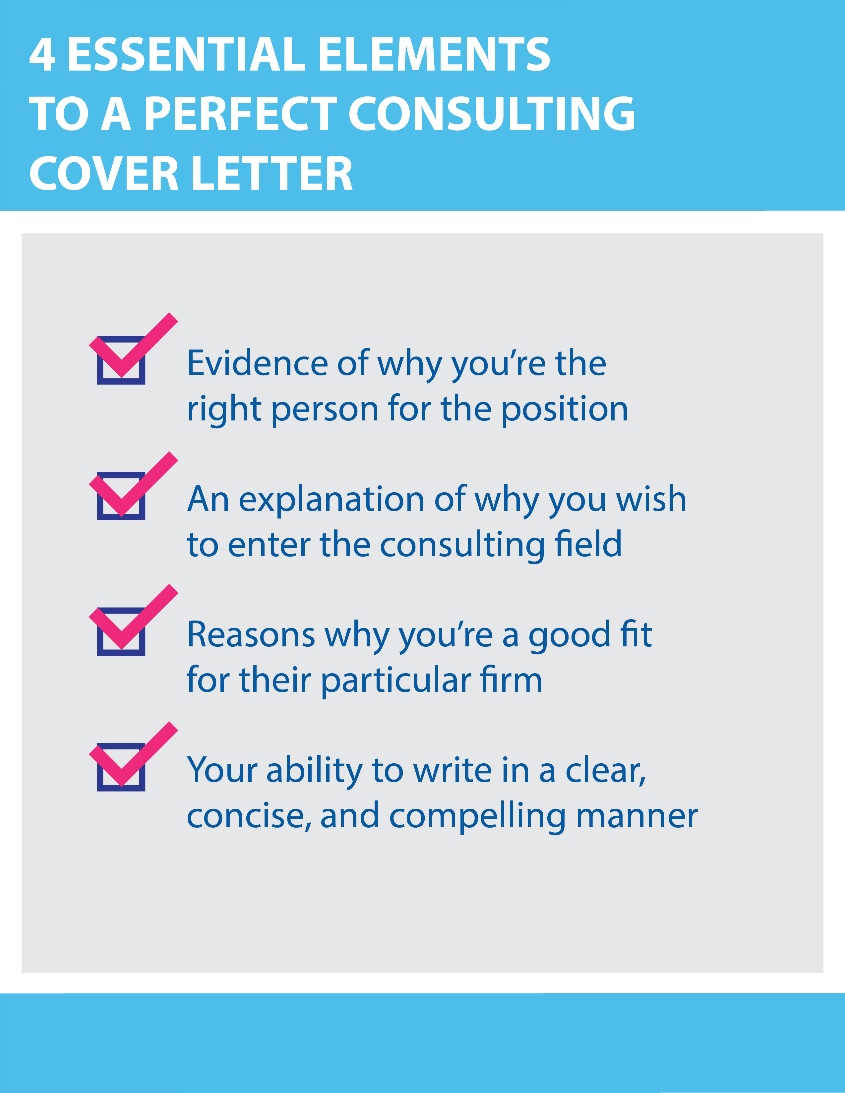FREE Resume Tips Email and Video Series
This form collects your name and email so that we can add you to our email list that delivers the free resources you are requesting. Check out our privacy policy for details on how we protect and manage your submitted data.
We’ll never spam you or share your email. Unsubscribe at any time.
Your cover letter can make a big difference when applying for a management consulting position. Because the cover letter is typically read before your resume, it plays an essential chronological role during the application process.
Consulting firms will typically read your cover letter to quickly identify what makes you different from thousands of other applicants. Therefore, writing a strong and unique cover letter can make you stand out from the competition and ensure that your achievements aren’t overlooked.
A strong cover letter presents an excellent opportunity for you to demonstrate why you’re the best candidate for the job, and to plead your case as to why the firm should hire you over other applicants.
This guide will cover 11 essential steps towards writing the perfect consulting cover letter.
Tip 1 — Know What Consulting Firms Are Looking For
The top consulting firms receive hundreds of thousands of applications each year. For example, McKinsey receives approximately 200,000 applications annually, of which only 2,000 applicants receive an offer. Consulting firms are faced with the arduous task of narrowing down the candidate pool to include only the best.
Interviewing candidates is not a cheap process. The firm wants to ensure that any candidate they interview is qualified for the position, is prepared for management consulting as a career, and is a good fit for the firm.
Therefore, top consulting firms look for four essential elements in a cover letter.
- Evidence of why you’re the right person for the position
- An explanation of why you wish to enter the consulting field
- Reasons why you’re a good fit for their particular firm
- Your ability to write in a clear, concise, and compelling manner

When reading cover letters, screeners will often ask,“Did the applicant spend enough time preparing a strong letter? Have they done their homework regarding the firm and the position in question? Do they have adequate writing skills to prepare compelling emails, reports, and presentations?“
A cover letter is a challenging document to prepare. You may feel worn out after spending hours on your resume, only to realize that you also need to spend as much time (if not more) on your cover letter.
Rather than looking at your consulting cover letter as an annoying extra step, think of it as an excellent opportunity to emphasize your skills and experiences and to set yourself apart from other applicants.
Tip 2 — Make Sure the Letter Has TheseFiveDistinct Sections
While your cover letter doesn’t need to take a formulaic approach, there are five distinct sections that should be covered. They are:
- An Introduction
The introduction should contain which position you’re applying for, your name, address, and contact information. It should also be short, sweet, and entertaining. Write it in such a way that the screener will want to keep reading into the second paragraph.
- Why You’re a Great Candidate
This is the section where you should blow your own horn. Each sentence should speak to your skills, education, and experiences — tying everything back to why you’re a great candidate. Ideally, this section should include your top three achievements to date (relevant to consulting, of course).
- Why Consulting is the Right Fit for You
Remember that the top priority of most consulting firms is to find out whether you’ll become a great consultant if hired. Even with memorable and unique qualifications, a recruiter may not be convinced that these skills will make you a good management consultant. To leave no doubt in their mind, dedicate a section towards explaining why you’re the right person for the job. You can use previous experiences (such as internships, jobs, or academic courses) to tie your career goals to the position in question.
- Why You’re Applying for the Position
The next section should cover why you chose to apply for this exact position in this firm. When laying out your case, identify unique reasons as to why you think McKinsey, Bain, BCG, Deloitte, or any other firm is your firm of choice. To make a compelling argument, identify specific people, reports, or projects that make your story believable. Don’t hesitate to mention specific employees or projects that caught your eye and sparked your interest.
- A Solid Conclusion
Finalize the letter by restating why you believe you’re a great candidate and how you can be of value to the company.
Tip 3 — LinkYour Cover Letter to Your Resume

A consulting cover letter is essentially an opportunity for you to expound on the information you wrote in your resume. What does this mean? It means that your cover letter should highlight the unique achievements, skills, and experiences (relevant to the position) that make you stand out from other applicants.
Your resume and cover letter should work hand in hand to strengthen your application further and demonstrate what makes you stand out.
Start off by identifying what you want the consulting firm to know about you. Draw attention to your career achievements. Maybe you started a business and sold it for a significant profit, or you worked overseas for a few years and have a diverse skillset.
Make sure that unique experiences are mentioned in the first few paragraphs of your cover letter to pique the interest of the resume screener.
Many resume screeners don’t actually read your entire resume.They simply scan it to identify specific items that make you stand out. Because resume screeners scan through hundreds of resumes at a time, they can easily overlook your unique achievements.
The cover letter is your opportunity to prevent this from happening. When you go into detail about achievements in your cover letter, you essentially draw the attention of screeners (and thus give yourself a better chance to land an interview).
Tip 4 — Don’t Forget About Your Resume
Even after referencing the unique skills you have in your cover letter, you need a strong consulting resume to back up your claims. A consulting resume is different from other standard template resumes, as it needs to emphasize a combination of skills that can make you successful as a consultant.
Here are resources that can help you prepare a strong consulting resume. A quality consulting resume will take just as much attention to detail as writing a strong cover letter will. In a nutshell, writing a consulting resume requires you to reflect on your past experiences, select the ones that are most relevant to consulting, and summarize them in a manner that resume screeners can easily scan and digest.
Top consulting firms typically look for the following in your resume:
- Big brand names (employers and schools)
- Strong academic performance (high GPA)
- Strong analytical skills (demonstrated in high standardized test scores)
- Strong leadership and communication skills
- Achievements versus career years (the longer your career is, the more achievements that screeners expect to see)

Also, refer to this resource to identify the top five mistakes that applicants make when writing a consulting resume.
Tip 5 — Avoid Using a Standard Template for Your Cover Letter
It’s no secret that it can be a pain to write a strong cover letter. It takes a lot of time and reflection. You’ll have to revise and edit the piece multiple times before submitting it. But, to truly stand out from other applicants, your letter needs to be interesting, personal, and unique.
The biggest mistake you can make is to copy a standard cover letter template and simply plug in your name and skillset. Screeners hate standard form letters because they’re boring to read, and they show that you’re unwilling to put in the necessary time and effort to write something unique. Because recruiters read thousands of cover letters, they can easily tell when a cover letter is written from a template.
When writing your consulting cover letter, make sure that every sentence is unique. While you may draw inspiration from various templates, add your personal twist to each word and modify it in a manner that emphasizes your unique skillset. For example, instead of starting with the usual format:
“Dear Sir/Madam, I write to apply for a consulting position….”
You can make things more interesting by starting off with what makes you different. Here’s an example:
“After attending Harvard for both my undergraduate and MBA education, I am confident in my ability to become successful as a [insert job position here] at McKinsey.”
Another example:
“My experiences overseas as a Peace Corps volunteer put me in a position to be successful as a [insert job position here] at BCG.”
The idea is to make every sentence in your cover letter count. Add a personal twist to all ofyour skills and experiences and tie them to the job responsibilities of the open position.
Tip 6 — Highlight Your Skills and Experiences via Evidence-Based Storytelling
In your cover letter, the goal should be to tell your story. Rather than simply listing your skills and abilities, demonstrate how various experiences have molded you into the perfect candidate for the position in question. Strive to show that you have what it takes, instead of telling.
For instance, instead of simply stating that you can lead, give a specific example of an experience where you showed leadership qualities. This evidence-based approach shows recruiters that your prior experiences have equipped you with the necessary skills to be successful.
Telling a story makes your cover letter much easier to read. It also makes you stand out from thousands of other applicants who may simply state “I’m a leader,” or, “I’m a hard worker.”
As you use this evidence-based approach, tailor every experience you mention to a specific skillset that is required for the job. If the position requires a candidate with strong interpersonal skills, explain a time when you worked within a team to achieve tangible results. Also, list out any challenges and how you overcame them.
It’s not simply about telling a story. Rather, it’s about telling a story that highlights why you’re a good fit for the job, as well as what makes you stand out from the competition.
Tip 7 — Show Your Value
A common mistake that many applicants make is to only think about personal achievements when applying for consulting positions. Recruiters often read through cover letters that have lots of “me meme” in them.
This is to say that many applicants focus on how they can benefit personally from the position in question, instead of demonstrating how they can become valuable employees (and eventually partners).
Many cover letters talk only about how the candidate will be able to elevate his/her career, experiences, and skills. Such letters only focus on personal goals instead of demonstrating how you can help the company become better. Remember that screeners are looking for candidates who will be of benefit to the firm, not those who are simply using this as an opportunity to enrich themselves and their careers.
When writing your cover letter, emphasize how your skillset will be of benefit to the company. To do this successfully, you need to do your research with regards to what the short-term and long-term goals of the firm are. You can then use these goals and relate them to your unique abilities and experiences.
Tip 8 — One Page Is the Perfect Length
It can be tempting to write a long cover letter, especially if you have a diverse skillset that you feel should be highlighted. However, being concise and keeping it relevant to the position is a much better strategy.
Aim to select only the most relevant experiences that apply directly to the position you’re seeking. You can typically fit these experiences in only one page.
Being concise also makes it easier for recruiters to read through your cover letter quickly without overlooking anything. Edit it down to a concise letter by re-reading and adjusting your original cover letter. The more you read it, the more unnecessary words and content you will find to take out.
Start early so that you can give yourself plenty of time to adjust your cover letter accordingly.
Tip 9 — Be Specific About the Position You’re Applying To
While this may sound obvious, many applicants tend to go off on a tangent about their skills and abilities without first mentioning the job they’re applying for. You should always state the position and office of the job you intend to apply for within the first sentence.
Remember that this information can still be included as you emphasize what makes you different. Here’s an example of an opening sentence that was used earlier in this guide:
“My experiences overseas as a Peace Corps volunteer put me in a position to be successful as a [insert job position here] at BCG.”
Being specific and concise about the job you’re applying for will make it easier for screeners to quickly recognize which position you are interested in.
Tip 10 — Give Yourself Time to Write a Quality Letter
Similar to consulting resumes, writing a strong consulting cover letter takes time. To be successful, you need to consider everything you’ve accomplished as well as what makes you different from everyone else. Don’t think that you can write a strong cover letter in one night. It requires multiple iterations, careful re-reading, and timely feedback.
You also need to make sure that the cover letter blends seamlessly with your resume, and it expounds on the outstanding skills and experiences contained in the resume itself.
Tip 11 — Proofread Thoroughly

And finally, make sure you eliminate any grammatical or spelling mistakes from the final cover letter. These mistakes make you appear careless and can result in being disqualified in the screening process. Don’t let something so simple be your downfall.
Take time to proofread. Ask peers and fellow professionals review your cover letter and give you feedback as well.
Example
Here is an example cover letter that highlights the tips I’ve mentioned. Reference this example as you write your cover letter to make sure that you hit all of the important sections. These items do not necessarily need to appear in the order I have them listed. But, make sure that they are all represented in your cover letter. Below is an example consulting cover letter.
You can also download the example by clicking here.

More Resources:
Free Case Interview Prep Program – Sign Up For Free Instant Access to the Largest Collection of FREE Case Interview Training Resources.
We’ll never spam you or share your email. Unsubscribe at any time.




219 thoughts on “Consulting Cover Letter Tips (and Template)”
Hey Victor,
I graduated form a T3 U and do not have a good GPA (due to some family issue), and I was working as a consulting role for my family issue . Do you think I can emphasize that experience to compensate my weak GPA.
I also have two job experiences (4 months for the first job and 1 year for the second job), and some internships (which are not in a big firm or anything).
My second job is working as a CS in a MNC.
All in all, my record is extremely bad.
Any idea you can share? with my situation?
Steve,
Does T3 U stand for “Top 3 University”? If so what country?
When you say you do not have a good GPA, how bad is it? What % level or actual GPA number?
When you say CS, do you mean customer service or do you mean computer scientist?
I’m presuming MNC = multi-national company. Is it well known?
I’m making some assumptions as to what you mean by these terms, to be candid nothing jumps out as super compelling as to why a consulting firm would want to pick your resume.
Do you have extremely high standardized test scores (especially in math)? That would help somewhat.
Are you objectively in the top 10% of your graduating class in terms of overall skills/experiences/talent?
The top consulting firms generally try to interview the top 10% of a top 3 university in a country, and try to extend offers to the top 1%. For certain highly competitive schools, like Harvard, the % would be higher. For less competitive schools, the ratios would be lower.
In my consulting resume toolkit, I mention that if you are mission one key aspect of the ideal candidate you can sometimes compensate for that if the other factors are strong and you do some serious networking.
If you are missing multiple factors, that’s generally too much of a setback to overcome in such a competitive field.
Without specifics, I can’t be certain as to whether my thoughts above apply to you. But those are my preliminary thoughts.
-Victor
Greetings Victor,
First of all thank you for such an amazing website and book. I have a question regarding to my condition as well:
I study mechanical engineering and started my studies firstly in Turkey. First I went to the USA to do a summer internship and then through an exchange program I came to Germany, to the best university in engineering field here. During that year I made my mind to stay and could stay as a regular student. Now I am at the end of my bachelor, and submitting my thesis in a month. I did also my internship at Bosch. Despite of lots of applications to McKinsey, BCG, RolandBerger and Bain, I haven’t got any positive response so far, even for an interview! That makes me sick because, my GPA is also about 3.2, which is good note at RWTH Aachen University. Junior Associate, Business Analyst even graduate program. None of them worked. Based on my profile (which you can also find at the link), where do you see the problem or where could it be devoted from?
If I cannot find any consulting jobs in a couple months, then I am going to start my master’s degree, again in mechanical engineering (already accepted). Is it really a “must” to be in management or economics area to go into consulting? What would be the reciept that you would write for me to be able to get a position in those big firms? I really would like to work in this field instead of being in technical field. I appreciate your help.
“Grüße” from Munich,
Tolga
Tolga,
I don’t know the German education system so it’s very hard for me to even speculate on your situation.
The two questions that jump out in my mind are:
1) is your university a target school for MBB? (If not search on this website for “non target school” and read those articles)
2) What % of students have a 3.2 GPA or higher? In general the top firms recruit the top 5% – 10% from a university. This is not always in terms of GPA, but it gives you a rough idea.
For example, when I was at Stanford, there were I think 400- 600 students who applied. My guess is 40 – 60 got a first round interview, and only 6 got offers.
If you want more precise guidance on evaluating your resume, see my resume scoring calculator which is a part of my Consulting Resume Toolkit
It is not necessary to have a degree or background in business to get a job offer in consulting. Consulting firms routinely hire engineers and really like the mathematical rigor these candidates possess and are accustomed to. So that really is not a concern and many would consider it an asset. It is easier to teach an engineer business math, than it is to teach a business major how to think logically, analytically, and mathematically.
Good luck
-Victor
Hello,
Great information thank you very much!
In you experience, what should I put if I do not know the name of the person that will review my cover letter?
Regards
Sergio,
Use “Dear Sir or Madam” or “To Whom it May Concern”
Either is fine. They are standard salutations that the reader will basically ignore unless a non standard one is used.
Victor
Dear Victor,
Thank you for all the useful data and advice on your site. I would have a question for your, if I even have any chances to get into top 3 Consulting firms. I have 6 years of marketing experience as product and brand manager in renowned FMCG companies (Danone, Lindt & Sprungli). I would love to switch to consulting, as I am best in analysis and strategies (I also like this side of marketing the most). Also I would like to work in different industries, to get broader knowledge. I will be taking GMAT next month. I am European (currently living in Switzerland), and also looking for a position here. Is it even worth trying with my background to get into consulting, or would MBA be mandatory? I am afraid to leave permanent job for a year to get MBA degree and then not get into consulting, as for “normal” marketing career, I don’t need an MBA.
Thank you for your help in advance,
Tina
Tina,
Without the MBA, I think you have a shot. It would depend on your most recently attended university, it’s prestige level, and how well you did there academically. A high GMAT score (even without the MBA) would help.
You would be known as a lateral hire from industry. When looking at your background, the resume reader is asking him or herself, did this person have the background we would have selected for coming out of university. If the answer is yes, but for whatever reason we missed this candidate or they weren’t interested in consulting at the time, that’s a good candidate for a lateral hire.
It also helps enormously if in addition to working a recognized FMCG companies that you did really well there. That helps a LOT. Your achievements need to be conveyed in you cover letter. In addition, the best chance to get in is via extensive networking and much case practice. Budget 50-100 hours on each. You ideally want your resume passed into the recruiting department by someone who is already working at the firm you’re targeting, where they have had coffee, lunch or a phone call with you, and they hand in the resume or email it in with the note “Spoke to Tina by phone. Seems like a very strong candidate. Definitely worth interviewing.”
These endorsements are not handed out easily. Don’t be surprised if your contact gives you an informal case over a lunch meeting. If you don’t do well, they will no risk their personal reputation endorsing you. Be PREPARED.
From others who have successfully gone down this path, the feedback is it’s totally possible but it is a lot of work to make contact with the right person. You have to balance making contact to get the lunch meeting with being prepared for an informal case should you get one over lunch. I recommend putting in at least 25 hours of case practice before a lunch meeting, if not 50 hours. The meetings or phone calls are hard to come by. they are definitely doable, but you won’t get more than a handful 2 – 5 meetings from 50 – 100 hours of focused networking, so you want to be prepared before the first meeting.
In general, I do not recommend a MBA if the value of the MBA is contingent on getting a specific job offer after the MBA. An MBA is worth it when you go, get value out of it even if say you don’t get a job offer in consulting. Since that does not seem to be the case for you, and since applying without a MBA is a possibility for you (again depending on your grades, gray scores, undergrad university and on the job accomplishments), I would suggest attempting to apply without the MBA first.
Victor
Hi Victor
Firstly, let me say that your website is very informative – I feel it is very relevant when applying to any job. I’ve been reading pages for hours now. However, I’ve completed my MBA earlier this month and I feel that I could use my skills and knowledge “for the better” in consulting.
My issues are that I don’t fall in a “target school” – in fact most consulting offices are based overseas with the exception of BCG and the Big 4 accounting firms. I have a well rounded profile – solid work experience with a Big 4 and some work with a start-up as well as good academics and extra-curricular activities.
End of the day, I don’t have a drool-worthy resume, but I have my share of enviable accomplishments which I am proud of. So should I continue working on networking through LinkedIn which seems to be my best shot given the scenario, take the chance and apply online or look at a Plan B?
Tia,
You can try applying online, but I don’t think it will be successful. The feedback and trends I’ve noticed from those who apply online successfully is they are all had drool worth resumes rich in keywords like “Harvard” “GMAT 700 “, etc…
Strong standard profile candidates from target schools can apply online successfully. If your background is strong but not easily characterized by keywords, networking via linked in or other means (friends, family, alumni connections) is your next best bet.
I don’t know your full background, so I can’t assess your odds of success. Based on what you did disclose, I would split your time between networking for consulting and plan B.
In my case, investment banking was my plan A and I totally struck put. Despite much networking, I didn’t get a single interview. Consulting was my plan B (I know hard to imagine given what has transpired since), and I did quite well. Although I was disappointed plan A did not work out for me, in hindsight, I was glad it did not. My plan B ended up being a better fit for me in the end (though not obvious to me at the time).
Also, I have found that networking even if I didn’t achieve the specific goal I had in mind was still quite useful. I got a better feel for my various career choices, made contact with some notable individuals some of whom are quite famous today, and more. So networking is rarely a waste of time. Just stay in touch with the people you make contact with even after the immediate focus is over. Offer to be a resource to them over the next few years. Let them know what career you ended up pursuing. Successful people appreciating having contacts in other firms and outside of their field.
Victor
I have a interesting background. After graduating and working as a Business analyst, I had an opportunity to travel abroad and work with an early stage startup as a development consultant , which did great! Secured seed funding, got a lot of media and press coverage, doubled the user base. We then used the same team to form a second, small company(web development) in cooperation with the startup. After a year 1 year I came back to the states and now I’m applying to BA S&O roles. Do I have a shot? How do I formulate all this into a cover letter?
Sammy,
I think you just explain your situation much like you did to me. The one question the resume reader will have in the back of their minds that you want to proactively address is how serious you are about consulting. Most people who leave consulting to work in startups generally don’t return to consulting. If you can address this question that would be really helpful. Your prior business analyst role will be seen favorably. Also the time to do other business things is also useful to them. What they are worried about is that you might join for 6 months, and then leave again for a startup. If you can reassure them you want to work in consulting for at least 2 years that will help address that issue.
Victor
Victor,
Thanks for the reply! After reading your reply as well as this post, I have made the necessary adjustments to my cover letter. For example, I have stated things such as,
“I believe these skills will enable me to help xyz’s clients attain profitable growth, strategically manage costs, and intelligently navigate risk through bridging the gap between vision and execution.”
“With my penchant for producing tangible results as well as my enthusiasm to grow with your firm, I am confident that I can make significant contributions to xyz’s Strategy & Operations team(or technology team)”
As well as,
“I look forward to the opportunity to interview and learn more about consulting career opportunities at xyz”.
In my opening sentence, I really wanted to use “Unlike other candidates you’re seeing who probably seem enthusiastic about consulting, I am certain of my interest in (technology)consulting because of my leadership and professional experiences as a recent graduate” but I’m not sure if thats over doing it?
Sammy,
As for your last sentence that you’re contemplating, it’s overdoing it because you do know for certain that it’s true. You are certain of your interest, but factually speaking you don’t appear to have access to everyone else’s cover letter or their backgrounds. You’re guessing, but you are phrasing the statement as a fact. In consulting, that’s over reaching. A client could say, “Oh really, what data source did you use to come to that conclusion?” and you’d have to justify it.
If you weed to be a bit more on the aggressive side, you could say, “unlike other candidates you MAY be seeing…” In the case, the phrasing is much more defensible. It’s doesn’t say unlike 100% of the other candidates that are not certain of their interest in consulting….
Good luck,
Victor
Hi Victor,
Your article was really informative. I have done my Phd in Neuroscience along with postdoc experience in UPenn and SUNY with several publications and served in editorial boards of some scientific journals. I am interested in consulting but do not have any experience. I applied for internships /volunteering in some consulting firms but couldn’t get through because of lack of any experience/background.
Please advice me how I should go about with this. How should I frame my resume /cover letter to better fit to these positions?
Thanks
Harry
Hi Victor,
I would like to thankyou for this great site, After reading all the question’s related to consulting i thought to tag my query here.I am a engineer graduate with 5 yr. of IT work experience , now i want to move in mgmt.consulting. Can u plz suggest me how my preparation should be and what are the areas i have to focus mainly to get in to consulting job.
And, i appeared for CMC (Certified Mgmt. Consultant) from india board , not sure how much weight this certification (if i clear) will give me in consulting job hunting.
Please advice me, awaiting for your reply.
Thanks
Kailas
Hi Victor,
I have a 1st class honors Masters (& Bachelors) degree in Biomedical & Mechanical engineering from Imperial College London.
For the past 3 years I’ve been working as a project engineer in R&D in top 3 orthopedic device company (based in Switzerland). This is a project management-heavy role that basically supervises a device (i.e. implant) development from intiail conception all the way through regulatory clearance and launch.
I am currently looking to broaden my experience and experience a new challenge. I think that Management Consulting at one of the top firms would be a good fit. My aim is to stay in the Switzerland.
I’m a little confused as to what level I should be applying for given my work experience and background? Associate-level or Felllow-level at McK?
Thanks!
Fernando
Fernando,
If you have more than 2 years work experience, you are supposed to apply as an Associate. For McKinsey in particular, I tend to advise people who are borderline to apply for the more junior position. In your case at 3 years, you could apply for either and they probably wouldn’t object. Strategically, I’d probably aim or the fellow role as I think you will be more competitive.
Victor
Dear Victor,
Thank you so much for this informative blog, access to your videos, and case interview samples. This has been very enlightening and I’ve become very interested in consulting, specifically in management and strategic consulting. I was wondering if you could give me some advice based on my track record?
I currently hold a PhD in Chemistry from a mid-range University, and have post-doc’ed for 4 years at a world-ranked 40s University. My undergrad GPA was only 3.0 but I graduated with first class honours because of a high mark in a major research project component. Other achievements in my track records include:
1. I achieved a perfect thesis score for my PhD, with direct degree conferral.
2. In my Post-doc role, I also worked as a technical consultant, and had the fortune to work with several clients in the manufacturing industry. I was able to conduct process optimization and commercial due diligence for these clients and improved their product performance by 20%.
I also coordinated and managed a research team of 12 researchers, conducted big-data analytics by writing custom codes in python and visual basic to deliver rapid analysis, which completed 5 months ahead of schedule.
I’ve had to coordinate and manage finances within our research team, which is approximately USD $200,000 per annum, and also assisted in securing USD $600,000 in funding from competitive sources.
3. During my post-doc role, I also had a hand in expanding a company that specializes in developing educational material for students preparing for GAMSAT and GMAT exams. I was coordinating a team of 8 members to develop and implement new national curricula.
4. Volunteer work: I’ve done a bit of volunteering work during my undergrad and PhD, which includes:
– 5 years as a first aid responder for St John Ambulance, during which I was promoted to Corporal rank within the first 12 months, and was responsible for coordinating first aid posts, and managing teams of first aid providers in major events (10,000 participants).
– 3 years as the student representative of the department’s safety committee, during which I devised safe working procedures for the entire department in compliance to national regulations. I also coordinated and maintained safe practices in the entire department for 200 students.
The issues I am facing is that I am changing fields from an academic one to a consulting one. I decided to change simply because I realized my passion is in the ability to solve real-life problems, rather than just scientific ones. I want to see real results and real impact on lives.
Victor, would you be able to give me your honest opinion whether I am suitable for any consulting firms, and which tier do I fit in? I am also not certain how many of the above 4 points is applicable to consulting. I am currently 31 years of age.
Many thanks for your time,
Alex.